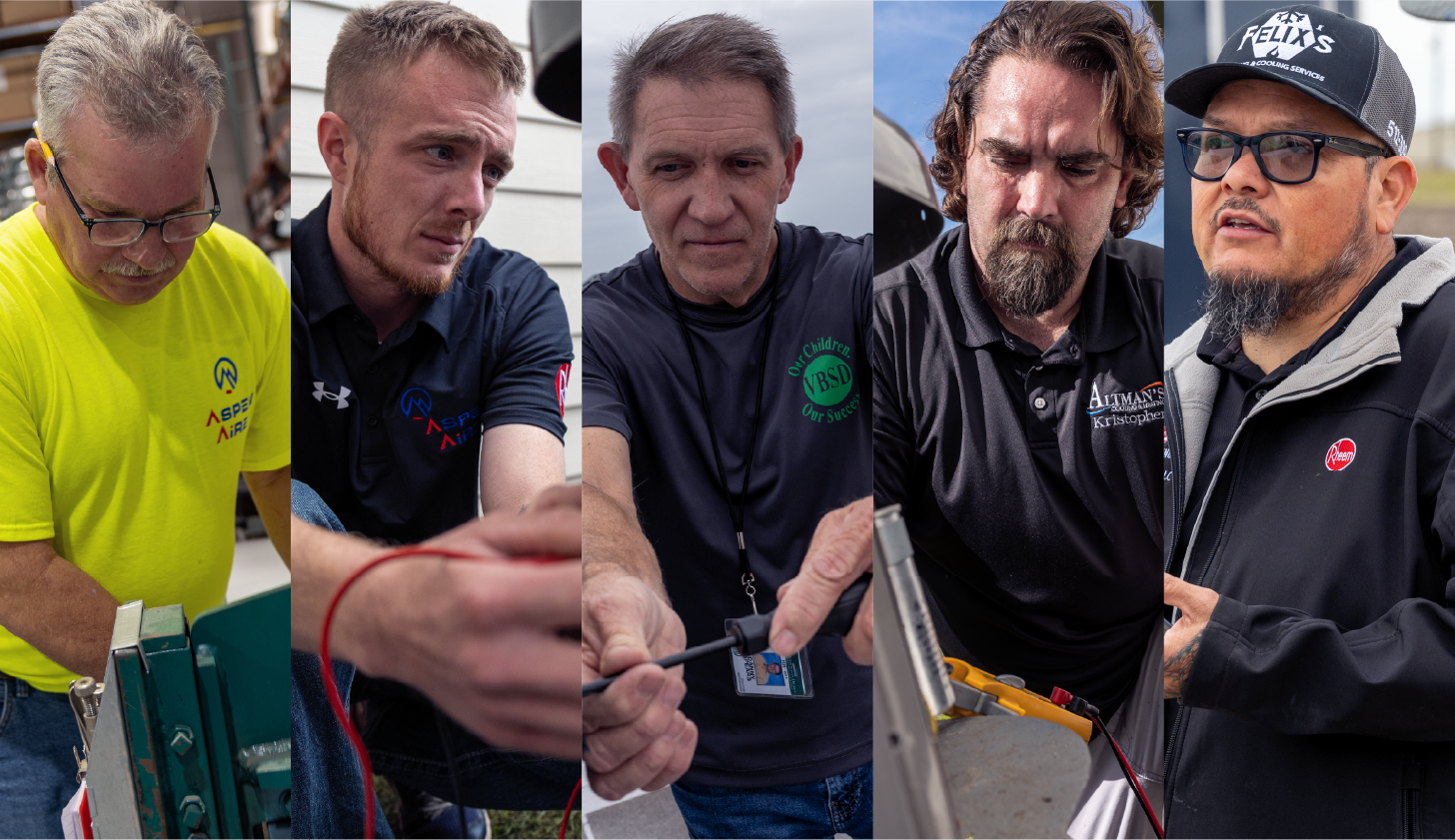Heat Pump Water Heater Electrical Requirements: Complete Rheem Guide
September 18, 2025
Proper electrical installation is essential for the safe, efficient operation of your Rheem® heat pump water heater. Whether you’re replacing an older model or installing a Rheem ProTerra® for the first time, understanding the heat pump water heater electrical requirements helps ensure compliance, performance, and safety. This guide covers everything from voltage and circuit needs to code compliance, troubleshooting, and when to hire a professional electrician.
What are the Electrical Requirements for Heat Pump Water Heaters?
Most Rheem ProTerra Hybrid Electric Heat Pump Water Heaters operate on a 240V dedicated circuit, and their installation must comply with both national and local codes. Below are the standard electrical specs and compliance requirements:
Standard Rheem ProTerra Requirements
- Voltage: 240V dedicated circuit (most models)
- Amperage: 15A or 30A, depending on model and features
- Wire Gauge: 14 AWG copper for 15A circuits, 10 AWG copper for 30A circuits
- Circuit Protection: Must have a dedicated circuit breaker matching the unit’s rating
- Grounding: Equipment grounding conductor required per National Electrical Code (NEC) Article 250. (Visit the National Fire Protection Association (NFPA) page for NEC access.)
Code Compliance Requirements
- Installations must follow current NEC regulations
- Always check for your local codes, which may impose additional or stricter rules, like including a visible disconnect switch near the unit
- Ground Fault Circuit Interrupter (GFCI) Protection is required by NEC in certain locations, like garages, basements, and outdoor settings
Check it out: get an overview of the Rheem Hybrid Electric Heat Pump Water Heater and the Prestige® ProTerra Hybrid.
Do Heat Pump Water Heaters Need a Dedicated Circuit?
Yes, a dedicated circuit is essential for installing a Rheem heat pump water heater for both safety and reliable performance. A “dedicated” circuit means the wiring serves only the heat pump water heater. It’s properly sized for the unit’s voltage and amperage, not shared with outlets, lights, or other appliances, and runs directly from the electrical panel to the unit.
Rheem units typically draw 12–20 amps, which qualifies as a high-power load. According to the NEC, any fixed appliance drawing over 12 amps must be on its own circuit. Sharing a circuit can reduce efficiency, cause malfunctions, or even damage the unit. More importantly, a dedicated line helps prevent overloads and ensures safe operation.
Before installation, you’ll need to evaluate your current electrical setup. Check for a 240V circuit and confirm it meets the required amperage and wire gauge. In many cases, an electrical upgrade or new circuit will be needed. To ensure everything is up to code and your system can handle the load, it’s best to have a licensed electrician perform a panel load calculation.
Can You Install a Heat Pump Water Heater Electrical System Yourself?
Installing a 240V heat pump water heater isn’t a typical DIY project. Electrical permits, code complexity, and warranty concerns make professional installation the safest route.
When Professional Installation Is Required
- Permits: Most local jurisdictions require licensed electricians for 240V work
- Warranty: Rheem may require professional installation to keep your warranty valid (visit our warranty registration portal)
- Insurance: DIY electrical work can jeopardize homeowners’ insurance
- Panel Modifications: Only licensed professionals should alter breaker panels
DIY Limitations and Risks
- Shock/fire hazards from improper wiring
- Code violations due to lack of familiarity
- Risk of inspection failure
- Liability for property damage or voided warranties
When to Always Hire a Pro
- Running new 240V circuits
- Routing wires through finished walls or attics
- Upgrading an electrical panel
- Unsure about NEC or local code compliance
Need a pro? Contact a local Rheem plumber for all your service and installation needs.
What Electrical Codes Apply to Heat Pump Water Heater Installation?
When installing a Rheem heat pump water heater, the unit must comply with all applicable NEC and local code requirements. These codes determine how circuits are sized, wired, grounded, and protected to ensure safe and effective operation.
Several key NEC articles apply to this type of installation. Article 422 outlines general appliance installation standards, while Article 440 focuses on circuit design rules specific to heat pump systems.
Article 210 covers branch circuit requirements, Article 250 addresses grounding and bonding, and Article 110 sets general electrical safety guidelines. (Get access to NEC standards on the NFPA site.)
Common code requirements include making sure the circuit is sized at least 25% above the unit’s current draw. In many installations, THWN-2 copper wiring is required, especially in damp or wet locations. Some areas also require a visible disconnect switch near the unit for safety and service access. Depending on where the unit is installed (such as in a garage, basement, or outside), GFCI protection may also be required.
It’s also important to check local codes, which can be more stringent than NEC rules. Local permitting and inspection timelines may vary, and areas subject to hurricanes, earthquakes, or other environmental factors may have additional installation requirements. Always check with your local building department or a licensed electrician to ensure full compliance with both NEC and local regulations.
What Are Common Electrical Installation Problems?
Improper electrical installation of a heat pump water heater can lead to performance issues and serious safety risks. Here are some of the most common occurrences:
- Sizing issues: Undersized circuits can cause breakers to trip repeatedly, while using the wrong wire gauge may lead to voltage drops or even overheating. Overloading the electrical panel by connecting too many devices can also compromise both safety and system reliability.
- Connection problems: Loose or poorly secured wires can cause arcing or even fires. Supplying incorrect voltage (for example, connecting a 240V unit to a 120V circuit) can damage the heater. Additionally, skipping the ground wire increases the risk of electric shock.
- Code violations: These include using a shared circuit instead of a required dedicated one, missing GFCI protection in areas where it’s mandated, and failing to install a disconnect switch when local codes require it.
To help avoid these mistakes, be sure to follow all installation guidelines. You can also refer to Rheem’s ProTerra Installation Video for a visual walkthrough of proper setup and safety requirements.
Heat Pump Water Heater Electrical FAQ
Q: Can I use an existing electric water heater circuit for a heat pump unit?
A: Possibly, but the circuit must be properly sized for the new unit’s requirements. Professional evaluation is always recommended (Unsure? Ask a Rheem pro near you.)
Q: Why does my heat pump water heater keep tripping the breaker?
A: Common causes include undersized circuit, loose connections, or unit defects. It’s best (and safest) to have an electrician diagnose the issue.
Q: Do I need GFCI protection for my heat pump water heater?
A: It depends on installation location and local codes, but they are generally required in garages, basements, and outdoor areas in most jurisdictions.
Q: How do I know if my electrical panel can handle a heat pump water heater?
A: The panel should have available space and adequate capacity. Professionals can perform a load calculation to help you determine what your panel can handle.
Q: Can I install a 120V heat pump water heater instead of 240V?
A: Some Rheem models offer 120V options, but with reduced performance and efficiency.
Q: What happens if the electrical installation doesn’t meet code?
A: Code violations can void warranty, fail inspection, and create safety hazards. Always ensure code compliance.
Installation Safety and Best Practices
Essential Safety Precautions: Always begin by shutting off power at the main electrical panel before starting any work. Use a multimeter to verify that the circuit is de-energized before touching any wires. For any 240V electrical tasks, only licensed electricians should perform the work. Make sure to use properly insulated and rated tools designed for electrical installations.
Best Practices for Performance: To prevent overheating, oversize the circuit by at least 25% above the unit’s current draw. Use copper wiring—ideally THWN-2—for better conductivity and durability, especially in damp locations. Ensure all electrical connections are tightened according to torque specifications to avoid arcing or loose connections. It’s also important to document everything, including permits, inspections, and model or serial numbers, for future reference.
Rheem-Specific Tips:
- For the best results, contact Rheem-certified pros who are familiar with proper installation procedures.
- Always match your installation to the exact specifications of your model.
- Be sure to register your unit to activate full warranty coverage.
- Watch our video: Clearances for Installing the Rheem® ProTerra
Conclusion: Ensuring Proper Electrical Installation
A properly wired Rheem heat pump water heater not only ensures safe operation but also improves energy efficiency and protects your investment. While electrical setup may seem complex, partnering with a licensed professional helps ensure your installation meets NEC and local code requirements, protects your Rheem warranty, and gives you peace of mind.
Next Steps:
- Use the Rheem pro locator to find a certified plumber near you.
- Have your panel and circuits evaluated before purchasing
- Obtain required electrical permits
- Schedule a final inspection post-installation







